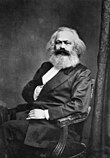
Back إعادة إنتاج (اقتصاد) Arabic Təkrar istehsal (iqtisadiyyat) Azerbaijani Reproduktion (Soziologie) German Reproducción (economía) Spanish 再生産 Japanese 재생산 Korean Reproductieschema Dutch Воспроизводство (экономика) Russian Розширене відтворення Ukrainian Takror ishlab chiqarish Uzbek
| Part of a series on |
| Marxian economics |
|---|
 |
In Marxian economics, economic reproduction refers to recurrent (or cyclical) processes.[1] Michel Aglietta views economic reproduction as the process whereby the initial conditions necessary for economic activity to occur are constantly re-created.[2] Marx viewed reproduction as the process by which society re-created itself, both materially and socially.
Economic reproduction involves:
- the physical production and distribution of goods and services,
- the trade (the circulation via exchanges and transactions) of goods and services,
- the consumption of goods and services (both productive or intermediate consumption and final consumption),
- the reproduction of voluntary and involuntary social relations, involving competition and cooperation (including the social relations of the class hierarchy).
Karl Marx developed the original insights of Quesnay to model the circulation of capital, money, and commodities in the second volume of Das Kapital to show how the reproduction process that must occur in any type of society can take place in capitalist society by means of the circulation of capital.[3]
Marx distinguishes between "simple reproduction" and "expanded (or enlarged) reproduction".[4] In the former case, no economic growth occurs, while in the latter case, more is produced than is needed to maintain the economy at the given level, making economic growth possible. In the capitalist mode of production, the difference is that in the former case, the new surplus value created by wage-labour is spent by the employer on consumption (or hoarded), whereas in the latter case, part of it is reinvested in production.
Ernest Mandel additionally refers in his two-volume Marxist Economic Theory to contracted reproduction, meaning production on a smaller and smaller scale, in which case business operating at a loss outnumbers growing business (e.g., in wars, depressions, or disasters).[5] Reproduction in this case continues to occur, but investment, employment, and output fall absolutely, so that the national income falls. In the Great Depression of the 1930s, for example, about one-quarter of the workers became unemployed; as a result of the 2008–9 slump, the unemployed labour force increased by about 30 million workers (a number approximately equal to the total workforce of France, or Britain).[6]
- ^ In a recurrent process, the same event repeats itself on multiple occasions. In a cyclical process, a sequence of events repeats itself on a regular basis.
- ^ Michel Aglietta, A theory of capitalist regulation. London: NLB, 1979 (expanded edition, 2015).
- ^ Karl Marx, Capital, Volume II. Penguin Classics, 1992.
- ^ Karl Marx, Capital, Volume I. Penguin Classics, 1990, chapter 23 and Capital, Volume II. Penguin Classics, 1992, chapter 20 and 21.
- ^ Ernest Mandel, Marxist Economic Theory, Volume 1. London: Merlin, 1968, chapter 10: "Reproduction and growth of the national income", p. 331. See also Joseph Tainter et al., The Collapse of Complex Societies. Cambridge: Cambridge University Press, 1990.
- ^ According to the International Labour Organization.
© MMXXIII Rich X Search. We shall prevail. All rights reserved. Rich X Search